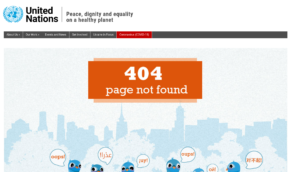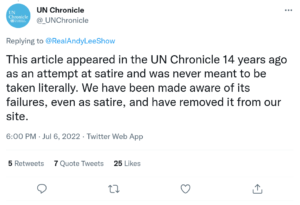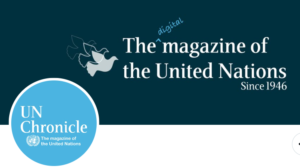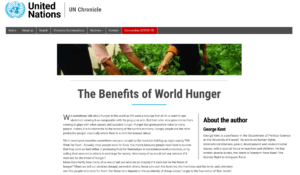Climate Depot Special Report
https://www.un.org/en/chronicle/article/benefits-world-hunger
Update: UN pulls the essay from its website on July 6, 2022! (UN essay archived here🙂
The UN Chronicle issued this statement via Twitter: “This article appeared in the UN Chronicle 14 years ago as an attempt at satire and was never meant to be taken literally. We have been made aware of its failures, even as satire, and have removed it from our site.”
The Benefits of World Hunger – By Professor George Kent in 2008 – the University of Hawaii – Published in UN Chronicle in 2008 & 2009
Click to access BenefitsofWorldHunger.pdf
Full Text of UN article:
We sometimes talk about hunger in the world as if it were a scourge that all of us want to see abolished, viewing it as comparable with the plague or aids. But that naïve view prevents us from coming to grips with what causes and sustains hunger. Hunger has great positive value to many people. Indeed, it is fundamental to the working of the world’s economy. Hungry people are the most productive people, especially where there is a need for manual labour.
We in developed countries sometimes see poor people by the roadside holding up signs saying “Will Work for Food”. Actually, most people work for food. It is mainly because people need food to survive that they work so hard either in producing food for themselves in subsistence-level production, or by selling their services to others in exchange for money. How many of us would sell our services if it were not for the threat of hunger?
More importantly, how many of us would sell our services so cheaply if it were not for the threat of hunger? When we sell our services cheaply, we enrich others, those who own the factories, the machines and the lands, and ultimately own the people who work for them. For those who depend on the availability of cheap labour, hunger is the foundation of their wealth.
The conventional thinking is that hunger is caused by low-paying jobs. For example, an article reports on “Brazil’s ethanol slaves: 200,000 migrant sugar cutters who prop up renewable energy boom”.1 While it is true that hunger is caused by low-paying jobs, we need to understand that hunger at the same time causes low-paying jobs to be created. Who would have established massive biofuel production operations in Brazil if they did not know there were thousands of hungry people desperate enough to take the awful jobs they would offer? Who would build any sort of factory if they did not know that many people would be available to take the jobs at low-pay rates?
Much of the hunger literature talks about how it is important to assure that people are well fed so that they can be more productive. That is nonsense. No one works harder than hungry people. Yes, people who are well nourished have greater capacity for productive physical activity, but well-nourished people are far less willing to do that work.
The non-governmental organization Free the Slaves defines slaves as people who are not allowed to walk away from their jobs. It estimates that there are about 27 million slaves in the world,2 including those who are literally locked into workrooms and held as bonded labourers in South Asia. However, they do not include people who might be described as slaves to hunger, that is, those who are free to walk away from their jobs but have nothing better to go to. Maybe most people who work are slaves to hunger?
For those of us at the high end of the social ladder, ending hunger globally would be a disaster. If there were no hunger in the world, who would plow the fields? Who would harvest our vegetables? Who would work in the rendering plants? Who would clean our toilets? We would have to produce our own food and clean our own toilets. No wonder people at the high end are not rushing to solve the hunger problem. For many of us, hunger is not a problem, but an asset.
Notes 1 Tom Phillipps, “Brazil’s ethanol slaves: 200,000 migrant sugar cutters who prop up renewable energy boom”. The Guardian. Online, 9 March 2007.
http://environment.guardian.co.uk/energy/story/0,,2030144,00.html
2 Free the Slaves. Online, 2007. http://www.freetheslaves.net/
UN Chronicle notes: George Kent is a professor in the Department of Political Science at the University of Hawaii. He works on human rights, international relations, peace, development and environmental issues, with a special focus on nutrition and children. He has written several books, the latest is Freedom from Want: The Human Right to Adequate Food.
#
END Full Text of UN Chronicle Essay
#
Climate Depot Comments:
There has been some discussion online about whether the article was a satire. See: Article describing “The Benefits of World Hunger” published by the UN goes viral, netizens confused whether it is real or satire
The UN Chorniclhle is now claiming — after 14 years — that the essay is “satire.” But the author of the essay disputes the UN’s claims. Climate Depot has determined that the UN Chronicle article on “The Benefits of World Hunger” is not a satire, according to the author of the report. Climate Depot spoke with the author, Prof. George Kent, emeritus of the University of Hawaii on July 6, 2022.
Update: On July 7, Kent reacted to the UN Chronicle pulling the article from the UN website and claiming Kent’s essay was “satire”:
Kent emailed Climate Depot on July 7: “I don’t recall any mention of satire when I submitted the paper in 2008, or at any time since then. They could have asked me to clarify my intentions at any time. They did not communicate with me before or after they took it down.”
Kent also emailed the following comments to Climate Depot:
Prof. George Kent’s July 6, 2022 email to Climate Depot:

“The essay was first published in the UN Chronicle in 2008, and again in 2009 when the UN Chronicle changed its format.” … “Yes, I wrote that paper. No, it is not satire. I don’t see anything funny about it. It is not about advocacy of hunger. I have not encountered anyone else who thought it might be advocacy. I don’t think the UN would have published it if they thought it was satire or advocacy.
The purpose of the paper was to highlight the point that the only way to understand the persistence of hunger is to recognize is that some people with power benefit from it. This point lit up for me when I was at a conference in India about some sort of assistance program for poor people, when one person, apparently a farm owner, stood up and argued against that asistance. His explicit concern is that the assistance would reduce his supply of cheap labor.
Persistent hunger is due mainly to the shortage of caring.”
Kent, in a phone interview with Climate Depot, said that he now “regrets” not being clearer and said that while his article was trying to be “provocative,” he was not “advocating” for preventing an end to global hunger.
#
Meanwhile, a new July 2022 UN report finds: U.N. says 2.3 billion people severely or moderately hungry in 2021 – UNITED NATIONS (AP) — World hunger rose in 2021, with around 2.3 billion people facing moderate or severe difficulty obtaining enough to eat — and that was before the Ukraine war, which has sparked increases in the cost of grain, fertilizer and energy, according to a U.N. report released Wednesday.
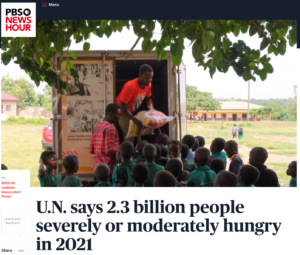
“The State of Food Security and Nutrition in the World” paints a grim picture, based on 2021 data, saying the statistics “should dispel any lingering doubts that the world is moving backwards in its efforts to end hunger, food insecurity and malnutrition in all its forms.”
“The most recent evidence available suggests that the number of people unable to afford a healthy diet around the world rose by 112 million to almost 3.1 billion, reflecting the impacts of rising consumer food prices during the (COVID-19) pandemic,” the heads of five U.N. agencies that published the report said in the forward.
#
UN Spins Professor’s Article on Hunger as ‘Satire’ — Professor Disagrees – The article, originally from 2009, resurfaced on the internet in recent days, with Climate Depot founder Marc Morano sharing the story on his Twitter account. “The UN Chronicle essay said the quiet part out loud, that the wealthy elites desire to keep the masses hungry and in check,” Morano said in exclusive comments to MRC Business. Morano also tore apart the UN Chronicle’s tweet, telling MRC Business: “The UN’s attempt to spin the article as satire is absurd and is nothing more than covering their behinds when they faced huge outcry over the article.”
Yahoo! News Shares Piece Falsely Claiming Controversial UN Hunger Article Was ‘Satirical’ – Kent unambiguously stated that his publication was not satire, however. “No, I never intended it as satire,” the retired professor told MRC Business. “I did not hope that it would be read as praise for hunger. My main point was and still is that some people benefit from the existence of hunger in the world. That helps to explain why hunger is so persistent in many places.”
#
Update: I spoke with the author of this UN article (Prof. George Kent). Kent says it was NOT satire, but a proactive take on hunger.
f
— Marc Morano (@ClimateDepot) July 6, 2022
Kent explains: "The purpose of the paper was to highlight the point that the only way to understand the persistence of hunger is to recognize is that some people with power benefit from it."
— Marc Morano (@ClimateDepot) July 6, 2022
The UN removed a page from its site entitled
– The Benefits of World Hunger
Fact checkers will say the page never existed. pic.twitter.com/G7sIzhVmir
— Cernovich (@Cernovich) July 6, 2022
#
Update: UN deletes article on “benefits” of world hunger after CFACT reporting – CFACT has made the UN “blink.”
The UN Chronicle, the “magazine of the United Nations,” has deleted an article from 2008 titled “The Benefits of World Hunger,” after CFACT’s Marc Morano, editor of ClimateDepot.com, published an interview with the author of the UN article, professor George Kent of the University of Hawaii.
While the UN Chronicle claims the article was “satire,” Kent, the author of the piece, said the article is definitely not a “satire” but was intended to be “provocative.” After CFACT’s interview with Kent was published, the UN Chronicle deleted the article 14 years after its original publication.
Related:
Climate Depot’s Morano: “If the Davos crowd of the World Economic Forum were looking for a better global environment on which to enact their central planning vision of a Great Reset, it would be hard to imagine a more conducive chaotic time than right now.” See: Watch video: World Economic Forum’s utopian Great Reset vision of 2030 – ‘You’ll own nothing, and you’ll be happy’ – ‘Whatever you want you’ll rent & it’ll be delivered by drone’ – Meat will be ‘an occasional treat’
 .
. 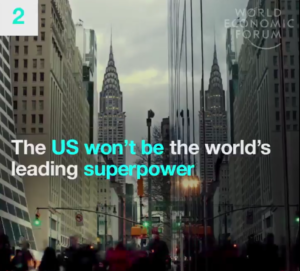
Morano: “The vision of transforming the world into unelected bureaucrats taking even more control of everyday life, has now all the ingredients to push it along. The last 2 years have seen endless emergency declarations, wars, massive government spending, debt, runaway inflation, supply chain issues, food shortages, no privacy from big-brother style government snooping of your movements, skyrocketing energy prices, chipping away at car and homeownership, climate lockdowns, oppressive censorship and crushing of dissent, limits on freedom of travel, and physical autonomy.
The chaos is music to the ears of those who don’t like the idea or the messiness of human freedom. The World Economic Forum’s vision is to crowd us all in cities, they want to have us own nothing, they want to regulate literally every aspect of our lives. Food shortages are a great way to collapse the current system and install a Great Reset.” See: “When there is food on the table there are many problems. When there is no food on the table there is one problem.” — Chinese proverb.
#
A 2020 report published by The Rockefeller Foundation that outlines a globalist plan to transform the food system is underway began circulating across the internet on Monday.
The Rockefeller Foundation document titled, “Reset The Table: Meeting the Moment to Transform the U.S. Food System” argues the U.S. food system must be seized and transformed to advance “social justice” and “environmental protection.”
The report also calls for “numerous changes to policies, practices and norms” to modify the U.S. food supply, including data collection and online surveillance to track people’s the dietary habits.
#
Update: UN Deletes Article Titled ‘The Benefits of World Hunger.’ Was It Real or Satire? –
Excerpt: First, it’s important to note that Kent himself denies the article was intended as a form of satire.
“I don’t think the UN would have published it if they thought it was satire or advocacy,” Kent told Climate Depot in a recent phone interview.
In the interview, Kent explains he was not advocating global hunger but was intending to be “provocative” by saying certain individuals and institutions benefit from global hunger.
“No, it is not satire,” Kent told Marc Morano, founder and editor of Climate Depot. “I don’t see anything funny about it. It is not about advocacy of hunger.”
I reached out to Kent and asked if the quotes were accurate, and he told me they were, adding that he intends to publish a paper this fall that will further detail his views.
“Marc understood me very well,” Kent told me in an email. “I hope my current paper on who benefits from hunger helps to make my position clear to everyone involved in this discussion.”

